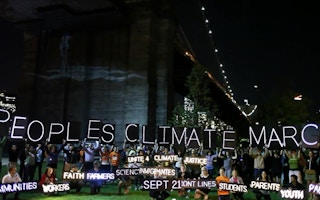The UN climate summit in New York next week gives different parts of society - from businesses to faith groups to ordinary people - a chance to call for stepped-up action on climate change and make their own pledges.
Here are some of the initiatives expected to happen at and around the main meeting on Sept. 23, which will feature announcements from 125 world leaders and their deputies.
People’s Climate March:
Two days before the summit, rallies, marches and protests will take place around the world, described by organisers as “the biggest-ever global demonstration for climate action in history”. The largest gathering will be in New York where upwards of 100,000 people are expected to demand leaders take action at the summit.
“There’s a vast latent constituency of people out there who are alarmed about climate change. But for years, nobody has put up a banner that said ‘This is the time, this is the place, to show you care’. The People’s Climate March is that banner, and we’re seeing a phenomenal response to it,” said Ricken Patel, executive director of Avaaz, which has led an online petition supporting the demonstrations.
More than 2,000 “People’s Climate” events are planned worldwide in 150 countries, from rural Papua New Guinea and Tanzania, to New Delhi, Bogota, London and Paris.
“
There’s a vast latent constituency of people out there who are alarmed about climate change. But for years, nobody has put up a banner that said ‘This is the time, this is the place, to show you care’. The People’s Climate March is that banner, and we’re seeing a phenomenal response to it
Ricken Patel, executive director of Avaaz
New business coalition:
A coalition of organisations that work with thousands of leading companies and investors, named “We Mean Business”, will be launched on Sept. 22. The coalition aims to inject a unified business voice into the climate debate and to highlight how the private sector can benefit from the transition to a low-carbon economy.
It is due to publish a report making the business case for low-carbon action and identifying policy measures that would enable business to do more to tackle climate change. Other corporate announcements are likely on expanding use of renewable energy and reducing deforestation.
Christiana Figueres, the U.N.’s top climate official, told journalists that there is still not a compelling level of action by businesses, partly because governments have not sent strong enough signals about how they will address climate change. Sending such signals would reduce uncertainty and create a stable regulatory environment, she said.
Carbon pricing:
More countries, regions and businesses are expected to sign up to a World Bank-led effort to put a price on planet-warming carbon dioxide emissions, and factor the cost of releasing carbon into their plans and operations.
The ultimate goal is to build an internationally linked carbon market, but the summit is not due to discuss a specific carbon price. Current prices vary widely across markets and company estimates. Carbon pricing will be the main theme of a private-sector forum convened by Ban Ki-moon on Tuesday.
Multi-faith campaign:
Spiritual and religious leaders from around the world will launch ourvoices.net on Sept. 17 at an event in the United Nations Church Centre in New York. The effort aims to encourage leaders “to hear the moral imperative for a global climate treaty” by December 2015 in Paris. The campaign will also focus on praying for people and governments “to have the determination to protect the planet through positive action”, including a dedicated prayer written by Archbishop Desmond Tutu.
The ourvoices.net platform aims to gather signatures from tens of millions of people to signal the strength of spiritual support for leaders to agree a strong climate pact. It will also showcase stories of faith communities working for a sustainable, clean energy future, and helping people affected by climate change.
Cities and climate change:
A number of mayors from around the world are expected to commit to disclosing the greenhouse gases emitted by their cities and setting targets for curbing those emissions, experts say. City leaders are also expected to showcase strategies to help vulnerable urban communities adapt to floods, sea-level rise and other climate impacts.
World Resources Institute (WRI) executive vice president and managing director Manish Bapna said mayors may also announce the development of a standard method of reporting emissions at a sub-national level, and talk about how to encourage the private sector to invest more in their efforts.
Farming and forests:
High-level dialogues will be held on expanding corporate efforts to reduce deforestation caused by the production of agricultural commodities including palm oil, soy and beef. Craig Hanson, director of WRI’s people and ecosystems programme, said there may be new promises to protect forests, restore degraded agricultural land and reduce food waste.

















